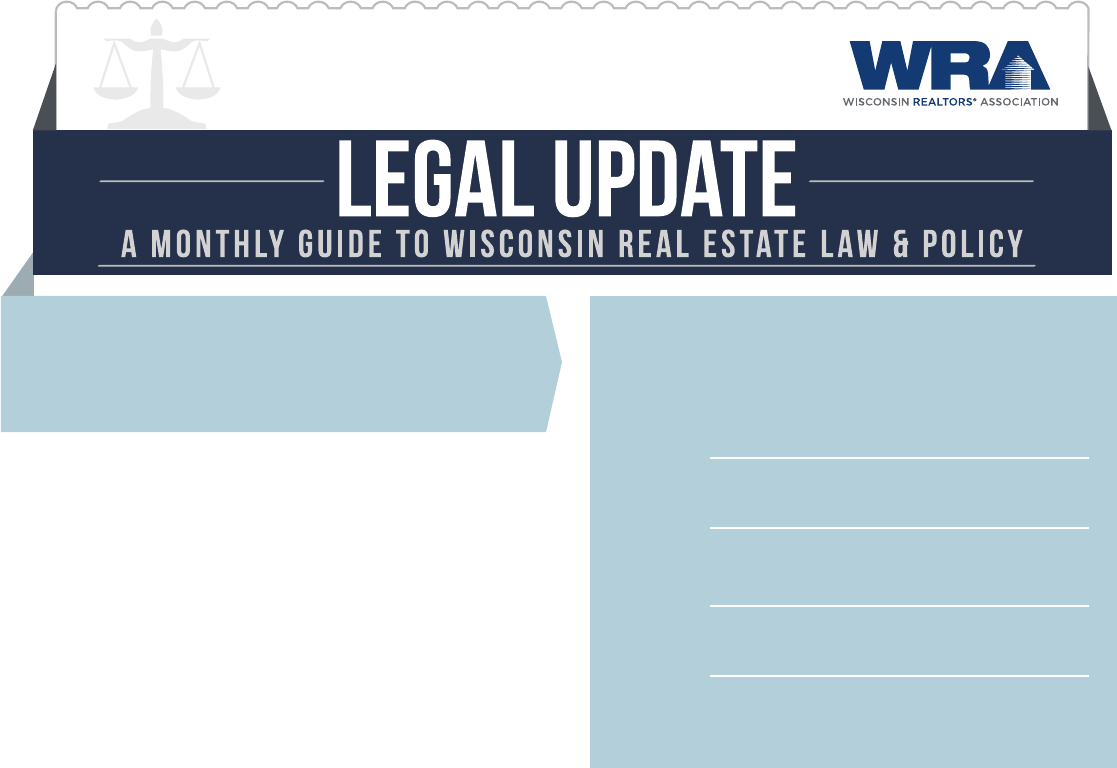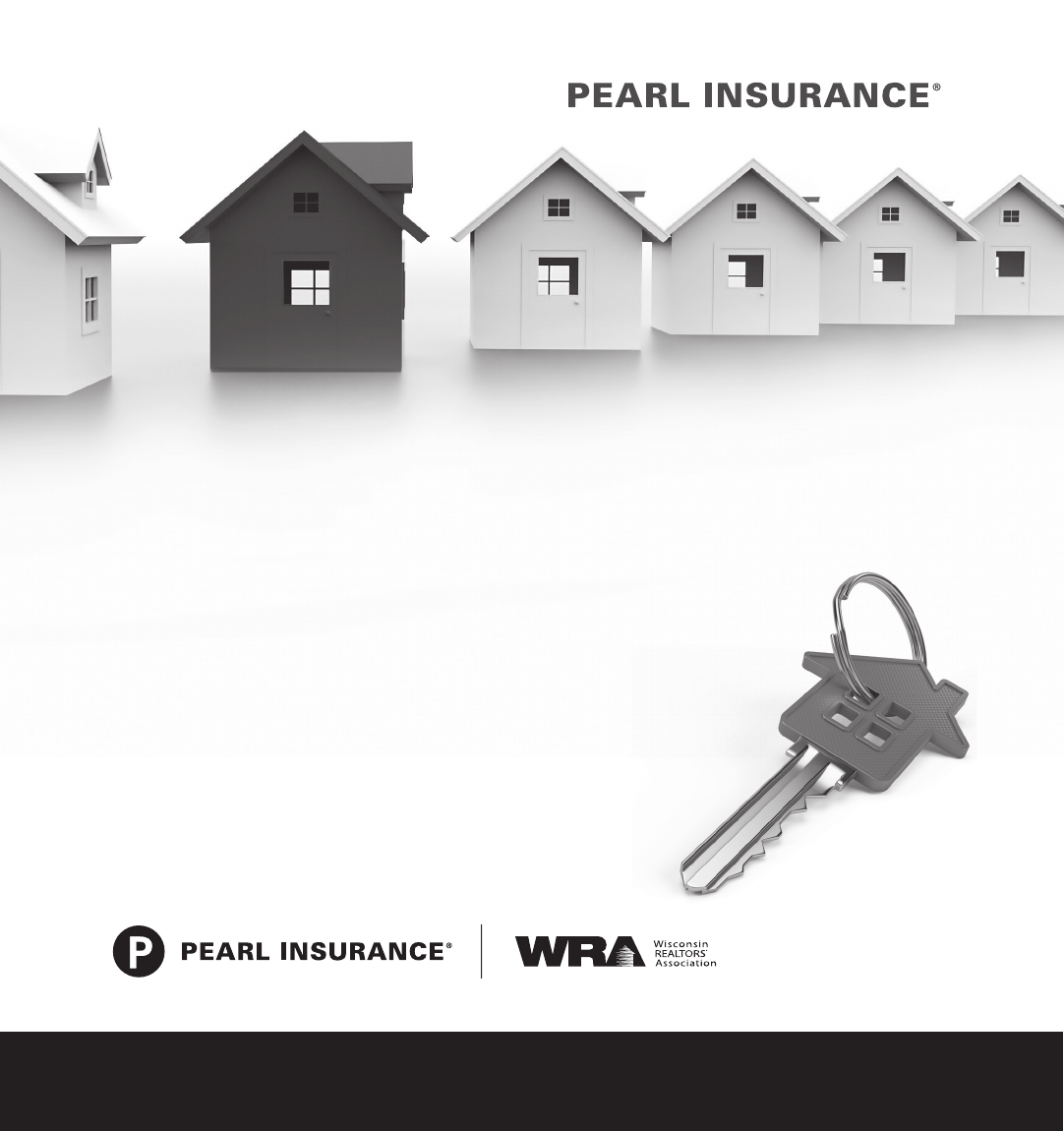
Wisconsin REALTORS® Association Page 1 Legal Update, November 2018
Within Wisconsin, REALTORS® may find themselves working with
brokers who are participants in other MLS systems, working with non-
REALTORS® who are not MLS participants, working in locations where
there is no MLS or engaging in commercial transactions which are
typically not entered in the MLS.
In each of these situations, an offer of cooperation and compensation,
standard of performance for earning the commission, and other
accompanying procedures and mechanisms are missing outside of the
MLS safety net: a built-in mechanism offering cooperation, a set formula
for offering compensation to subagents and buyers' firms as a percentage
of the purchase price, and procuring cause as the standard of performance.
Outside of the MLS, there are no automatic offers of cooperation and
compensation — brokers must make an offer to the cooperating brokers
who, by their words or deeds, may accept that offer and create an agreement
for cooperation and compensation. Procuring cause does not determine
who gets paid unless the brokers have specifically agreed procuring cause
determines who is paid commission. In short, unless the brokers have a
standing policy letter agreement or a compensation agreement for that
transaction, there is no compensation agreement and the listing firm has
no obligation to pay the cooperating firm.
Similarly, there is no standing framework establishing the terms and
conditions of referral agreements. A real estate licensee normally expects
to receive a fee after the licensee refers his or her client or customer
to another real estate licensee and the latter completes a transaction
involving the referred party regardless of whether that latter licensee is in
the same state or a different one. The referring licensee typically receives
a share of the commission or fee earned by the licensee to whom the
referral was made as a referral fee.
Licensees must establish the terms and conditions for the payment of a
fee in exchange for the referral of a client or customer. While many referral
agreements are verbal, it is far better to have a written agreement rather
than discover there was no mutual understanding about the size or timing
of the fee payment.
This Legal Update discusses the agreements necessary for establishing
a licensee’s right to be paid referral fees and the right to receive
commissions in non-MLS transactions. The discussion begins with
referral agreements, including a referral agreement drafting checklist and
a new WRA Referral Agreement. Next is an overview of the MLS system
of cooperation and compensation, which illustrates the elements needed
in compensation agreements when a transaction is not governed by the
MLS. A checklist for drafting a non-MLS compensation agreement and a
new WRA Compensation Agreement form also are included.
Referral Agreement Requirements
Referrals are considered common practice and are typically based
upon an explicit agreement between the referring and receiving brokerage
firms. A referral agreement names the client or customer being referred
and spells out the referring broker's entitlement to a referral fee in the
event of a sale, lease, exchange or other successful transaction. Referral
arrangements seem to work on a relatively trouble-free, self-executing
basis, though sometimes interstate referral fee collections can be difficult.
In Wisconsin, referral agreements are largely governed by two statutes:
Wis. Stat. § 452.19 and § 452.14(3). Section 452.19 limits the payment
of referral fees to persons licensed or registered in Wisconsin to practice
real estate, or persons regularly and lawfully engaged in real estate
brokerage in another state or country. Referral fees may be paid to
other Wisconsin licensees as long as that person's license is active and
regardless of whether the person holds a salesperson's license. The fact
that the person is not currently associated with a firm is not relevant.
Under § 452.14(3)(f), any referral fee being paid to an agent
associated with a firm in connection with a real estate transaction
may be received by the agent only from the firm. A licensee with a
NOVEMBER 2018, 18.11
Compensation and Referral
Agreements
IN THIS ISSUE
Referral Agreement Requirements
WRA Referral Agreement Form
MLS Compensation
Compensation Agreements
WRA Compensation Agreement Form
P1
P3
P5
P6
P7

Wisconsin REALTORS® Association Page 2 Legal Update, November 2018
P2
salesperson’s license, however, can make a referral and directly receive
a referral fee even if the licensee is not associated with a firm. A non-
affiliated licensee with a broker’s license also can make a referral and
directly receive a referral fee.
Although it is tempting to want to create an agent-to-agent referral
agreement, one agent directly paying another a referral fee runs counter
to license law when the agent making the referral and receiving the
fee is associated with a firm. As is often the case, it may be helpful to
“follow the money.” Who can pay a referral fee and who can receive a
referral fee? While the only limitation on who can pay a referral fee is
“a licensee,” the rules vary depending upon who makes the referral and
receives the fee.
Real estate licensees
Under Wisconsin law, only a real estate licensee can receive a referral
fee. Wis. Stat. § 452.19 addresses fees and commissions and provides
in subsection (1):
Wis. Stat. § 452.19 limits the payment of referral fees, finders’ fees
and commission splits to Wisconsin real estate licensees and persons
regularly and lawfully engaged in real estate brokerage in another
state. “Person” refers to both individuals and entities per Wis. Stat.
§ 990.01(26). Thus, a referral fee may be paid to an individual with a
broker’s or salesperson’s license or a licensed broker entity under Wis.
Stat. § 452.19.
Agent associated with a firm makes the referral
Wis. Stat. § 452.14(3)(f) states:
Stating the same principle in reverse, Wis. Stat. § 452.19(2)
proclaims:
Thus, if the person making the referral is an agent associated with
a firm, Wis. Stat. § 452.14(3)(f) requires that any referral fee be paid
to the agent’s firm. It is a license law violation for that agent to accept
the referral fee from anyone other than the agent’s firm. This is true
regardless of whether the agent has a salesperson's or a broker’s license –
what is determinative is that the agent is associated with a firm.
Agent not associated with a firm makes the referral
A licensee with a Wisconsin salesperson’s or a broker’s license,
however, can make a referral and directly receive a referral fee if the
licensee is not associated with a firm. Wis. Stat. § 452.19(1) only
requires that the referral fee be paid to one licensed under chapter 452
of the statutes or another state.
Thus, Wisconsin licensees may pay referral fees to other Wisconsin
licensees as long as that person's license is current and valid. It is
prudent practice to ask for a copy of an agent's license or verify the
agent’s license status before entering into an agreement for a paid
referral. The agent must have a valid, current license — in Wisconsin he
or she must complete the continuing education requirements and pay
the renewal fee each biennium to keep his or her real estate license
current. Wisconsin real estate licenses may be confirmed using the
Department of Safety and Professional Services Licensee Lookup at
https://app.wi.gov/licensesearch.
It is not necessary that the agent be a local REALTOR® Board or WRA
member.
Out-of-State Broker
Wisconsin law contemplates referral arrangements being made with
licensees in other states and in other countries. Wis. Stat. § 452.19
REALTOR® Practice Tip
Wisconsin law prohibits real estate licensees from paying
referral fees or finders' fees to unlicensed individuals. Under
Wis. Stat. § 452.19, a real estate licensee cannot compensate
non-licensees for referring prospective buyers or sellers to the
licensee. The licensee cannot give the person a gift in exchange
for the referral. Whether the gift is cash or another item of value,
it is considered compensation and violates Wisconsin law.
REALTOR® Practice Tip
An agent making a referral should include his or her firm in
the referral agreement because the referral fee will have to be
paid to the referring agent’s firm before it can be paid to the
agent, subject to whatever independent contractor agreement
provisions, office policies, or other arrangements or deductions
might apply within that firm.
REALTOR® Practice Tip
Based upon Real Estate Examining Board policy, the payment of
the referral may only be made to an active licensee. Therefore,
it may be wise to condition the agreement to pay the referral
fee upon the referring agent’s license being active both when
entering into the referral agreement and at the time of payment.
Before paying the referral fee, it is prudent to again verify that
the person holds an active license and thus is eligible to receive
the referral fee.
No licensee may pay a fee or a commission or any part thereof for
performing any act specified in this chapter or as compensation
for a referral or as a finder's fee to any person who is not licensed
under this chapter or who is not regularly and lawfully engaged in
the real estate brokerage business in another state, a territory or
possession of the United States, or a foreign country.
If a licensee is associated with a firm, all fees or commissions
and any part thereof for performing any act specified in this
chapter and all compensation for a referral or as a finder's fee
shall be paid to the firm.
The board may revoke, suspend, or limit the license of any
licensee, or reprimand the licensee, if it finds that the licensee
has done any of the following: ….
(f) Accepted from any person except the firm with which the
licensee is associated, if the licensee is associated with a firm,
a commission or valuable consideration for the performance
of any act specified in this chapter or as compensation for
referring a person to another licensee or to any other person
in connection with a transaction.

Wisconsin REALTORS® Association Page 3 Legal Update, November 2018
provides that “No licensed broker may pay a fee . . . as compensation for
a referral . . . to any person . . . who is not regularly and lawfully engaged
in the real estate brokerage business in another state, a territory or
possession of the United States or a foreign country.”
With respect to agents from other states or countries who send referrals
and wish to be paid, they must be regularly and lawfully engaged in real
estate brokerage. This means that they must hold whatever credential
is necessary and meet any other applicable standards that are required
in that state or country to lawfully engage in real estate practice. They
must also regularly engage in real estate brokerage. This would seem to
rule out persons with credentials who actually work in other fields and
may rule out part time agents, depending upon what is judged to be
"regular" within that jurisdiction.
This might also go in the opposite direction. A Wisconsin broker can
refer a party and receive a referral fee from a broker from another state
or country. That broker ideally should confirm that payment of a referral
fee to an out of state licensee is permitted under that state’s law.
Company policy
Firms should consider establishing a company policy requiring written
referral agreements and licensure confirmation as early as possible
with regard to any licensee who will be paid a referral fee. The firm
may set standards as to any forms that should be used and whether
agreements may be entered into by agents alone or whether the firm
is the contracting party. Company policy should also address whether
referrals and fees are personal to agents, business income for the firm,
or both. Perhaps referrals of friends and family members may be treated
as personal referrals and referrals involving contacts made from real
estate practice on behalf of the firm are company referrals. It would be
helpful to clarify what happens to a referral fee paid to the firm in terms
of what, if any, portion will, in turn, be paid to the agent and whether the
firm retains any portion thereof.
Checklist for Referral Agreements
A member received a referral from an Illinois broker and agreed to pay
a fee if the buyer purchased a property. What the Wisconsin broker did
not realize was that the Illinois broker had referred the buyer to three
local agents. When the deal closed two of the agents were disputing the
selling side and the Illinois broker was demanding fees from both. This
scenario illustrates what may occur when brokers do not follow the basic
pointers for brokers entering into referral agreements.
Members may use the new WRA Referral Agreement or another form
or enlist the assistance of their company attorney to develop a referral
agreement format appropriate to the company’s marketplace and
transactions.
The following points may need to be addressed in a referral agreement,
depending upon the individual circumstances:
1. The full names and contact information for the referred parties.
2. The full names of the referring and receiving agents and
companies.
3. Company addresses and contact information.
4. The state of licensure and license number of the referring agents.
The receiving agent should either require written confirmation
that the referring agent holds an active real estate license and/
or should seek written confirmation of an active license from the
appropriate state real estate commission.
5. Whether the referral originated with the other agent or the
company. To put it another way, if the referring agent goes to
another company before the referral fee is paid, does the fee
follow the agent or stay with the company? This may depend
upon the referring agent’s company policy – are referrals personal
to the agents in that company or are they considered part of the
company’s business.
6. Whether the referral is exclusive to the receiving company or being
made to multiple companies. If that is the case, specify how to
determine which receiving agents/companies are responsible for
paying the referral fee.
7. A clear and precise statement of the basis for computing the
fee. For example, if the fee will be based on a percentage of
commissions actually collected, specify if this is the gross
commission received by the receiving company or the net
commission received by the receiving agent. Business practices
vary from market to market, so it is necessary to spell out exactly
how the fee will be determined.
8. Who is responsible to pay the fee and exactly to whom the fee
should be paid. Is it the agent or the firm? This needs to be
stated.
9. Performance standard that must be met before the fee is earned.
For example, the fee may be due if there is an accepted offer
that closes. It should also be stated if there are any restrictions
or limitations with respect to types of properties or transactions,
geographic areas, etc.
10. Agreement term — how long is the referral agreement good for?
If the referred party buys or leases a property with the receiving
agent ten years after the referral was made, is the fee still due?
WRA Referral Agreement Form
The new WRA Referral Agreement is structured to be used as an
agreement between two firms both in Wisconsin or when the firm
making the referral is in another state or country. It also has a separate
section for those referrals made by a Wisconsin licensee not associated
with a firm. The WRA Referral Agreement is available in zipForm. See
a sample copy of the WRA Referral Agreement at www.wra.org/WRA-
ReferralAgreement/Sample.
P3P3
REALTOR® Practice Tip
Before entering into a contract to pay an out-of-state real estate
broker a referral fee, a Wisconsin broker should obtain evidence
or documentation that the broker requesting the referral fee is
regularly and lawfully engaged in real estate brokerage in the
other state to comply with Wis. Stat. § 452.19.
REALTOR® Practice Tip
It is prudent practice when entering into a written referral
agreement to assure the terms and conditions of the referral are
documented and clearly understood.

Wisconsin REALTORS® Association Page 4 Legal Update, November 2018
Section I, Firm to Firm Referral
Lines 1-10 identify the client, customer or other party being referred
and describe the property or transaction of interest.
Lines 11-31 begin with a check box on line 11 signaling an agreement
between two firms. The Sending Firm is identified on lines 12-20, and
lines 18-19 ask for the Sending Firm’s license and tax identification
information in preparation for the possible payment of the referral fee to
this firm. The Receiving Firm is identified on lines 21-27.
The Referral Agreement Terms on lines 29-30 state, “The undersigned
agree the Sending Firm is referring the Referred Party to the Receiving
Firm. The Receiving Firm will pay the Referral Fee to the Sending Firm
on the terms and conditions stated in Section III of this Agreement.”
Line 31 includes a blank line where the firms can indicate who will pay
the Referral Fee, whether that be the Receiving Firm or a specific agent
within that firm who has that obligation.
Section II, Wisconsin Agent Not Associated with Firm
Section II begins with a check box on line 32 to indicate the
Agreement is being used for a situation where there is a Wisconsin agent
not associated with a firm making the referral and hopefully receiving
the referral fee. The Sending Agent is identified on lines 33-40, and
lines 39-40 ask for the agent’s license and Social Security numbers in
preparation for payment of the referral fee. The firm receiving the referral
is identified on lines 41-47.
The Referral Agreement Terms on lines 48-51 state, “The undersigned
agree the Sending Agent is referring the Referred Party to the Receiving
Firm. The Receiving Firm will pay the Referral Fee to the Sending Agent
on the terms and conditions stated in Section III of this Agreement.”
Line 51 includes a blank line where it can be indicated who will pay
the Referral Fee, whether that be the Receiving Firm or a specific agent
within that firm who has that obligation.
Section III, Referral Agreement Terms and Conditions
Section III of the Agreement gives the Referral Agreement Terms and
Conditions on lines 52-78. Lines 52-57 address the referral fee so that
parties to the Agreement can state the amount of the fee, if applicable,
or indicate how the referral fee will be computed. Any percentage
used in the formula should be stated. Often this may be a percentage
of commission, but the trick is to specify what commission. Is the
percentage applied to a net or gross commission, is the commission
to be the full commission or the list side or the sell side, or perhaps the
percentage is applied to the buyer’s broker’s fee? The percentage might
also be applied to the purchase price, list price, lease commission or
some other amount. The parties must be sure they have defined this
precisely and given an exact formula or explanation for computing the
referral fee so they are on the same page and disputes can be avoided
later on.
The standard of performance is stated on lines 58-61 so it is clear
when the referral fee is earned, for instance, when the Referred Party
is in a transaction that closes or when the Receiving Firm receives
commission in the transaction involving the Referred Party. Lines 62-63
give the deadline for payment of the referral fee. Lines 64-66 indicate
the Sending Firm or Agent must have a real estate license that is valid
and current both when the agreement is entered into and at the time of
payment, as is required by Wisconsin law and REEB policy for the receipt
of a referral fee.
Lines 67-68 indicate whether the Referral Agreement is exclusive
or whether the same referral was made to other firms as well. The
Agreement Term is stated on lines 69-71, stating an end date but
allowing for the possibility of an extension by written mutual agreement
of the parties. Additional terms and conditions may be stated on lines
72-78 and an attachment may be added via line 79. The signature lines
follow on lines 80-83.
Legal Hotline Questions & Answers
The following questions were asked of the Legal Hotline regarding
referral agreements.
An attorney from Illinois has a client who is interested in property
in Wisconsin. Broker X would be the selling broker in the transaction.
The attorney requested a referral fee. Is this legal?
Wis. Stat. § 452.19 limits the payment of referral fees, finders’ fees
and commission splits to persons licensed or registered in Wisconsin
to practice real estate, or persons regularly and lawfully engaged in
P3P4

Wisconsin REALTORS® Association Page 5 Legal Update, November 2018
real estate brokerage in another state. This would exclude the attorney
unless he has the credentials necessary under Illinois law to practice
real estate and regularly engages in real estate brokerage. This likely
would not be the case if his primary occupation were his law practice.
A licensee is considering retiring. Can she continue to receive
referral fees as long as she is licensed even if she is not with the
company?
Yes, a licensee not associated with a firm may make a referral and
directly receive a fee. Wis. Stat. § 452.19 limits the payment of referral
fees, finders’ fees and commission splits to Wisconsin real estate
licensees and persons regularly and lawfully engaged in real estate
brokerage in another state. The referral fee may be paid to a person with
either a broker or salesperson license. It is not necessary that a licensee
be currently associated with a firm to receive a referral fee.
A real estate licensee gave names to a builder/broker and the
builder/broker was planning on paying a referral fee to the licensee.
Now the builder/broker is concerned about whether it is legal for him
to pay referral fees for building prospect names?
Under Wis. Stat. § 452.19, licensees may pay referral fees only to
other licensees. Since both the builder and the licensee hold real estate
licenses, there is nothing to stop the builder from paying the licensee
the referral fee.
If the builder did not hold a real estate license, he could still pay the
referral fee to the licensee. It is only real estate licensees who cannot
pay non-licensees under § 452.19 – the statute does not apply to non-
licensees who pay referral fees.
A few agents in a firm want to partially retire, but are looking for
a way to continue working with past clients by making referrals. The
retiring agents would like to keep their licenses under the firm but not
pay the fees, etc., associated with the franchise. Can the firm start
a separate LLC for agents who wish to retire and hold their license
under that LLC for referrals to agents in the firm? The franchisor has
agreed that the option is available.
The broker may consider creating a Limited Function Referral Office
(LFRO). The REALTOR® dues formula provides that each Designated
REALTOR® is responsible for dues for each licensee affiliated with the
broker. One exception to the dues formula is if the Designated REALTOR®
has an LFRO. An LFRO is a separate legal entity for credentialed
licensees who do only referrals. The entity is created and engages
exclusively in soliciting and or referring clients and customers and the
agents are not engaged in listing, selling, leasing, managing, counseling
or appraising real property. There would be no trust account because
brokerage services are not provided.
An LFRO is not required in Wisconsin for an agent to receive a referral
fee. Wis. Stat. § 452.19 permits a broker to pay referral fees and finders'
fees to other Wisconsin licensees as long as that person's license is
active and regardless of whether the person holds a salesperson's
license or an inactive license rather than a broker's license. The fact
that the person is not currently associated with a firm is not relevant.
MLS Compensation
A critical part of every real estate transaction is establishing a
REALTOR®’s right to be paid a commission if the REALTOR® successfully
assists the party in obtaining the desired buyer, tenant or property.
Compensation in real estate transactions may be established by the
multiple listing service (MLS), by standing policy letters between firms,
by compensation agreements pertaining to single transactions or a
combination of these.
Often compensation is understood solely in terms of an MLS. The MLS
contract for compensation between the listing firm and the cooperating
firm is unilateral in nature. The listing firm determines the terms and
conditions of the compensation offered to potential cooperating firms.
There is no contract formed between the listing firm and the potential
cooperating firms until the listing firm’s offer of compensation is accepted
by the cooperating firm. Acceptance occurs through performance by the
cooperating firm, that is, their efforts to find a party for a successful
transaction.
MLS Cooperation
In listing a property with the MLS of a Board of REALTORS®, the listing
firm makes a blanket unilateral offer of cooperation and compensation
to other MLS Participants. All MLS participants are potential cooperating
firms. The listing firm specifies on each listing whether cooperation and
compensation are offered to subagents or buyers' firms or both. The
offer to compensate is accepted by a firm that becomes procuring
cause of the sale or lease.
MLS Policy
Multiple Listing Policy Statement 7.23, Information Specifying the
Compensation on Each Listing Filed with a Multiple Listing Service of an
Association of REALTORS®, Handbook on Multiple Listing Policy (2018)
provides that (revision and amendment dates omitted):
P3P5
In filing property with the multiple listing service, participants
make blanket unilateral offers of compensation to the other
MLS participants and shall therefore specify on each listing filed
with the service the compensation being offered by the listing
broker to the other MLS participants. This is necessary because
cooperating participants have the right to know what their
compensation will be prior to commencing their efforts to sell.
The listing broker retains the right to determine the amount of
compensation offered to subagents, buyer agents, or to brokers
acting in other agency or nonagency capacities, which may be
the same or different.
This shall not preclude the listing broker from offering any MLS
participant compensation other than the compensation indicated
on his listings as published by the MLS, provided the listing broker
informs the other broker in writing in advance of their submitting
an offer to purchase and provided that the modification in the
specified compensation is not the result of any agreement among
all or any other participants in the service. Any superseding offer
of compensation must be expressed as either a percentage of
the gross sales price or as a flat dollar amount.
While offers of compensation made by listing brokers to
cooperating brokers through MLS are unconditional (except
where MLS rules create specific exceptions as specified
elsewhere in this policy statement), a listing broker’s obligation to
compensate a cooperating broker who was the procuring cause
of sale (or lease) may be excused if it is determined through
arbitration that, through no fault of the listing broker and in the
exercise of good faith and reasonable care, it was impossible or
financially unfeasible for the listing broker to collect a commission
pursuant to the listing agreement. In such instances, entitlement

Wisconsin REALTORS® Association Page 6 Legal Update, November 2018
Code of Ethics
Article 3 of the Code of Ethics establishes the principal of cooperation,
which is the bedrock of relationships between REALTORS®: “REALTORS®
shall cooperate with other brokers except when cooperation is not in
the client’s best interest. The obligation to cooperate does not include
the obligation to share commissions, fees, or to otherwise compensate
another broker. (Amended 1/95)”
The Code of Ethics Standard of Practice 3-1 indicates that while
cooperation may often be offered, a REALTOR® cannot assume that this
automatically includes an offer of compensation:
Compensation Agreements
Standing bilateral policy letters are often used to create long-term
cooperation and compensation agreements, while other compensation
agreements generally are used for a single transaction. The new WRA
Compensation Agreement form is structured to be a single transaction
compensation agreement although it could be modified to have a
broader application if desired.
A broker’s compensation agreement may be used in many different
situations:
• It may be used in commercial transactions where the properties are
not listed in any MLS or similar service establishing cooperation and
compensation. Commercial firms sometimes proceed based on a
handshake or an assumed understanding of commission, but the best
protection is to have a written compensation agreement stating the
commission percentage/amount and what must be done to earn it.
• When the property is located in a geographic area not within the
jurisdiction of an MLS, a compensation agreement will be desirable.
Without the MLS firms have to create their own agreements regarding
cooperation, what the commission will be and how it is earned. There
is no automatic “safety net” establishing those elements.
• Where one of the firms is not an MLS participant, a written
compensation agreement is ideal for filling in the blanks for the non-
MLS firm. The offer of cooperation and compensation in the MLS is
made only to other MLS participants, so if the cooperating firm is
not an MLS participant then a separate written agreement regarding
commission and performance standards is needed. That agreement
may, if desired, replicate what was offered in the MLS and offer the
same terms to the non-MLS participant.
• Where the MLS offer of compensation has been rejected because the
firms want to negotiate compensation different than what is in the MLS,
a written compensation agreement fills in the gap. If the cooperating
firm is rejecting the compensation offered by the listing firm, that is
best communicated directly between the two brokers. Sometimes
there is a tendency to recite this fact in an offer, which certainly serves
to notify the parties, but the offer is a contract between the buyer
and the seller, so a communication between brokers is better made
directly between them in an email or other written correspondence. It
may be advisable to affirmatively state that the agreed commission or
fee is in place of, and not in addition to, any compensation offered in
the MLS or elsewhere.
With respect to a compensation agreement, the only necessary
parties are the listing firm and the cooperating firm. The seller and the
buyer might, however, acknowledge this agreement for the purpose of
consenting to a buyer’s broker receipt of compensation from someone
other than the client if that consent has not already been given elsewhere.
This is necessary for compliance with Wis. Admin. Code § REEB 24.05(1).
A broker’s compensation agreement should indicate that the listing
firm is offering cooperation and compensation, and that the cooperating
firm is accepting this offer. The agreement may also indicate whether
cooperation is extended via a subagency relationship or buyer brokerage.
Members may wish to enlist the assistance of their company attorney
to develop a compensation agreement format appropriate to the firm’s
marketplace and transactions. A compensation agreement should:
1. Describe or identify the property,
2. Name the parties,
P3P6
question to be determined by an arbitration hearing panel based
on all relevant facts and circumstances including, but not limited
to, why it was impossible or financially unfeasible for the listing
broker to collect some or all of the commission established in
the listing agreement; at what point in the transaction did the
listing broker know (or should have known) that some or all of
the commission established in the listing agreement might not
be paid; and how promptly had the listing broker communicated
to cooperating brokers that the commission established in the
listing agreement might not be paid.
The multiple listing service shall not have a rule requiring
the listing broker to disclose the amount of total negotiated
commission in his listing contract, and the multiple listing
service shall not publish the total negotiated commission on a
listing which has been submitted to the MLS by a participant.
The multiple listing service shall not disclose in any way the total
commission negotiated between the seller and the listing broker.
Note 1: The compensation specified on listings filed with the
multiple listing service by the participants of the service shall be
expressed as a percentage of the gross sales price or as a definite
dollar amount. Multiple listing services may, as a matter of local
discretion, allow participants to offer cooperative compensation
as a percentage of the net sales price, with net sales price defined
as the gross sales price minus buyer upgrades (new construction)
and seller concessions (as defined by the MLS unless otherwise
defined by state law or regulation). The essential and appropriate
requirement by a multiple listing service is that the information
to be published shall clearly inform the participants as to the
compensation they will receive in cooperative transactions unless
advised otherwise by the listing broker in writing in advance of
their submitting an offer to purchase.
Multiple listing services shall not publish listings that do not
include an offer of compensation expressed as a percentage
of the gross selling price or as a definite dollar amount, nor
shall they include general invitations by listing brokers to
other participants to discuss terms and conditions of possible
cooperative relationships.
REALTORS®, acting as exclusive agents or brokers of sellers/
landlords, establish the terms and conditions of offers to
cooperate. Unless expressly indicated in offers to cooperate,
cooperating brokers may not assume that the offer of cooperation
includes an offer of compensation. Terms of compensation, if any,
shall be ascertained by cooperating brokers before beginning
efforts to accept the offer of cooperation. (Amended 1/99)

EDITORIAL STAFF
Author
Debbi Conrad
Production
Emily Zampardi
ASSOCIATION MANAGEMENT
Chairman
Jean Stefaniak
President & CEO
Michael Theo, CAE
CONTACT INFORMATION
Wisconsin REALTORS® Association
4801 Forest Run Road, Suite 201
Madison, WI 53704
608-241-2047
800-279-1972
LEGAL HOTLINE
Ph: 608-242-2296
Fax: 608-242-2279
Web: www.wra.org
The information contained herein is believed
accurate as of November 1, 2018. The information
is of a general nature and should not be considered
by any member or subscriber as advice on a
particular fact situation. Members should contact
the WRA Legal Hotline with specific questions or for
current developments.
Reproduction, use or inclusion of this material in other
publications, products, services or websites is not
permitted without prior written permission from the
WRA or its Legal Department.
SUBSCRIBE
This Legal Update and other Updates beginning
with 94.01 are available to members online at
www.wra.org/LegalUpdates.
A Legal Update subscription is included with
member dues. Members are alerted via email
when a new issue is available online.
The nonmember subscription rate for the Legal
Update is $75. A subscription includes 12
monthly issues.
Contact the Wisconsin REALTORS® Association
to subscribe:
4801 Forest Run Road,
Madison, WI 53704-7337
608-241-2047
800-279-1972
www.wra.org
WRA Legal Update © 2018
Wisconsin REALTORS® Association Page 7 Legal Update, November 2018
3. Name the brokers,
4. Identify agency relationship —
subagency, buyer brokerage or other
relationship,
5. Offer and acceptance of cooperation,
6. State the amount of the commission or
fee to be paid by the listing firm to the
cooperating firm in clear, specific terms,
7. Indicate when compensation shall be
paid, and
8. State what must be done to earn
compensation — the standard of
performance.
WRA Compensation
Agreement Form
The new WRA Compensation Agreement
is structured to be used as a compensation
agreement between two firms with regard to a
particular property and transaction identified
in the Agreement. The WRA Compensation
Agreement is available in zipForm. See a sample
copy of the WRA Compensation Agreement at
www.wra.org/WRA-CompensationAgreement/
Sample.
The Agreement starts out by identifying the
property and the parties in the transaction
at lines 1-8. The listing agent and firm are
identified and contact information is given on
lines 9-15; the cooperating agent and firm are
identified and contact information is given on
lines 16-22.
The cooperation and compensation agreement
terms are on lines 26-31. The cooperating firm’s
agency relationship with the listing firm and the
form of cooperation is indicated on lines 26-27
in a “strike and complete as applicable” format.
The cooperating firm may be a subagent of the
listing firm, a buyer's firm or possibly have some
other relationship written into the blank line, as
the case may be.
Lines 28-31 describe how the compensation
will be calculated. This may be a flat fee, a
percentage of the gross or net purchase price,
or any other amount the parties agree on. The
key is that the amounts, percentages, formulas,
etc., are stated clearly and precisely to avoid
any confusion or disagreement at closing.
Lines 32-34 delineate the standard of
performance, in other words, what has to have
been done in order for the Cooperating Firm
to earn and become entitled to the described
compensation. The firms may agree the
standard is procuring cause or may establish
another benchmark such as closing, the Listing
Firm’s receipt of commission from the seller, etc.
Line 35 gives the deadline for payment of the
described compensation to the Cooperating
Firm. The Agreement Term is stated on line
36, stating an end date. Additional terms and
conditions may be stated on lines 37-43, and
an attachment may be added via line 44. The
signature lines follow on lines 45-48.
Legal Hotline Question &
Answer
The following question was recently asked
of the Legal Hotline regarding a broker’s
entitlement to compensation:
Can a non-MLS member who is also not a
REALTOR® member be paid a commission?
The agent has a residential listing, and a
broker submitted an offer and he is not a
member of the WRA or the MLS.
Wis. Stat. § 452.19 limits the payment of
referral fees, finders’ fees and commission
splits to Wisconsin real estate licensees and
persons regularly and lawfully engaged in real
estate brokerage in another state. An individual
with a broker's license may provide brokerage
services and be paid a commission even if the
licensee is not a REALTOR® or a participant in
the same MLS as the listing firm.
Before offering to pay a commission, the
agent may refer to company policy to determine
how to negotiate and document the payment
of commission. For instance, firm policy may
require verification that the person holds a
current license and thus is eligible to receive
commission. Wisconsin real estate licenses may
be confirmed using the DSPS Licensee Lookup
at app.wi.gov/licensesearch. Firm policy may
also require a written compensation agreement
including the standard of performance that
must be met to earn the offered commission.
P3P7
REALTOR® Practice Tip
A cooperating firm should always attempt
to enter into a compensation agreement
before submitting any offers to purchase
or leases to the listing firm. The listing
firm may lose incentive to agree to
the cooperating firm’s compensation
proposal once the listing firm has an offer
in hand.

With Pearl Insurance, you could be benefiting from extensive
risk management tools and services, including educational pieces,
seminars, and webinars. Plus, our comprehensive E&O coverage
is tailored to meet your specific needs!
• Coverage for Sales of Agent-Owned Property
• 50% Deductible Reduction for Defense and Damages
• Lockbox Coverage to Policy Limits
• Defense Outside Limits
• Automatic Fair Housing Coverage
• Instant Quotes
*
Don’t wait to gain peace of mind—contact
a Pearl Insurance Representative today.
Industry-Leading
Risk Management
by
* Instant coverage defined as 48 hours or less.
140582
pearlinsurance.com/eo
|
800.447.4982
TM
